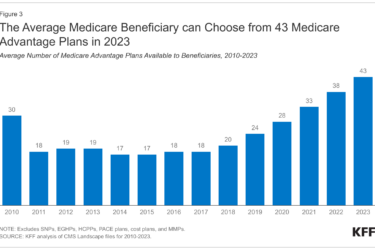
In a report last week, the U.S. Government Accountability Office confirmed what Fred Schulte and other journalists at the Center for Public Integrity (CPI) have been reporting on the Medicare Advantage program for two years.
In the report, “Medicare Advantage Fundamental Improvements Needed in CMS’ Effort to Recover Substantial Amounts of Improper Payments,” the GAO showed that CMS estimated that it improperly paid $14.1 billion in 2013 to insurers running Medicare Advantage plans. The reason for the overpayments is just as Schulte and colleagues found: the health insurers could not provide documentation for the diagnoses used to support higher payments.
CMS pays health plans based on the severity of illness among health plan members. Under this risk score system, the health insurers submit diagnoses to CMS for the Medicare Advantage members covered under their contracts. But Schulte and colleagues at CPI found that insurers often report that their members have multiple chronic and costly conditions, a practice known as upcoding. In a series of articles, “Medicare Advantage Money Grab,” the journalists explained how health insurers use risk-adjusted payments to get CMS to overpay them.
It’s worth noting that the GAO began its work on this report on October 2014, just four months after CPI’s first article in the Money Grab series.
As the GAO’s findings and CPI’s reporting show, this story is important because the Affordable Care Act uses a similar risk-based payment method.
The work of Schulte and colleagues at CPI won a second-place prize in the AHCJ’s 2015 Awards for Excellence in Health Care Journalism in the business category.
CPI also reported, as did the GAO report, that CMS’ audits are insufficient to recover overpayments adequately.
The GAO said: “CMS conducts risk adjustment data validation (RADV) audits of MA contracts which facilitate the recovery of improper payments from MA organizations that submitted beneficiary diagnoses for payment adjustment purposes that were unsupported by medical records. With a separate national audit, CMS estimated that it improperly paid $14.1 billion in 2013 to MA organizations, primarily because of these unsupported diagnoses.”
Compounding the problem, CMS’ method of selecting Medicare Advantage contracts for audit is flawed and the flaws in CMS’ methods to collect overpayments do not comply with federal standards, GAO said.
In an article on the GAO’s findings, Schulte called the RADV audits secretive and said the audit program has cost CMS $117 million but recouped only $14 million. “CMS officials counter that the mere threat of RADV audits has caused health plans to voluntarily return approximately $650 million in overpayments – and that upcoming audits will recover tens of millions more,” he wrote.
Whether the audit program is successful or not is just one part of a bigger problem, as CPI reported in the Money Grab series. For the series, CPI analyzed more than a dozen confidential RADV audit reports. “We found that medical conditions couldn’t be verified in as many as two-thirds of the patient records sampled, which translates into millions of dollars in overpayments,” CPI wrote in its AHCJ award entry. “We also were able to report that federal officials knew for years some plans were abusing the billing system, but repeatedly failed to demand refunds.”
Schulte and other journalists (such as Trudy Lieberman at the Columbia Journalism Review) have shown that the Medicare Advantage payment system is not well understood and, unlike Medicare fee-for-service, is largely invisible.
“The biggest problem is that it’s been next to impossible to get records on Medicare Advantage spending, and yet CMS has been releasing records on payments to doctors and hospitals,” Schulte told me. “But Medicare Advantage has been like a black box. We had to sue to get what we got.”
CPI used a court order in a Freedom of Information Act lawsuit to get records from CMS that show that over-billing by MA plans has wasted tax dollars almost since risk scores were introduced in 2004, Schulte reported.
Related
Tips on prying loose records using FOIA requests, lawsuit
Sources for reporting on Medicare and Medicare Advantage
How one reporting team used public records to find questionable Medicare Advantage spending










